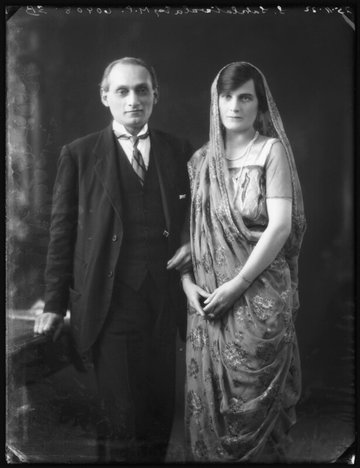
Shapurji Saklatvala
‐
MP for both the Labour Party and Communist Party in 1920s London
Place of birth
Location(s)
Derbyshire
DE4 3NZ
United Kingdom 2 St Albans Villas,
Highgate Road,
London
NW5 1QY
United Kingdom
Place of death
London
Date of time spent in Britain
1905–36
About
The nephew of J. N. Tata, Shapurji Saklatvala travelled to England in 1905 to recuperate from malaria and to manage the Tata company office in Manchester. He married Sarah Marsh in 1907 (a waitress he had met at the hydro in Matlock where he had been treated). They moved to London in 1907 and Saklatvala joined the Independent Labour Party (ILP) in 1909. In 1921 Saklatvala was adopted as the Labour candidate for Battersea North, despite joining the Communist Party in the same year. In November 1922 he won the seat for Labour and was defeated in December 1923. He regained the seat in October 1924, when he stood as a Communist representative, and held the seat until 1929. Saklatvala was the third Asian to become an MP in Britain (all, incidentally, of Parsee background).
Saklatvala raised Indian issues in Parliament. He was a member of the Indian Home Rule League (founded in 1916). He was also a founder member of the Workers' Welfare League in 1917. This League was initially concerned with the working conditions of Indian seamen in London but soon widened its objectives to improve the position of all types of Indian workers. He was an influential figure to Indian students in London in the 1920s and 1930s, but was banned from returning to India because of his Communist affiliations. He died in his home in London in January 1936 and was buried in the Parsee burial-ground in Brockwood, Surrey.
Mulk Raj Anand, Mancherjee Merwanjee Bhownaggree (previous Asian MP), Clemens Palme Dutt (CPGB), Rajani Palme Dutt (CPGB), Jomo Kenyatta, Harold Laski, Krishna Menon, Dadabhai Naoroji (previous Asian MP), Walter Neubald, George Padmore, Sehri Saklatvala (daughter), S. A. Wickremasinghe.
Communist Party, Independent Labour Party, India Home Rule League, Social Democratic Foundation, Workers' Welfare League.
Hinnells, John R., Zoroastrians in Britain (Oxford: Oxford University Press, 1996)
Hinnells, John R., The Zoroastrian Diaspora: Religion and Migration (Oxford: Oxford University Press, 2005)
O'Malley, Kate, 'Metropolitan Resistance: Indo-Irish Connections in the Inter-War Period' in Rehana Ahmed and Sumita Mukherjee (eds) South Asian Resistances in Britain 1858–1947 (London: Continuum, 2012), pp. 125–39
Squires, Mike, Saklatvala: A Political Biography (London: Lawrence & Wishart, 1990)
Squires, Mike, ‘Saklatvala, Shapurji (1874–1936)’, Oxford Dictionary of National Biography (Oxford University Press, 2004) [http://www.oxforddnb.com/view/article/35909]
Saklatvala, Sehri, The Fifth Commandment: A Biography of Shapurji Saklatvala (Salford: Miranda Press, 1991)
Visram, Rozina, Asians in Britain: 400 Years of History (London: Pluto Press, 2002)
Wadsworth, Marc, Comrade Sak: Shapurji Saklatvala, A Political Biography (London: Peepal Tree, 1998)
L/PJ/12/406, Scotland Yard Report on Central Association of Indian Students, India Office Records, Asian and African Studies Reading Room, British Library, St Pancras
Saklatvala Papers, Mss Eur D1173, Asian and African Studies Reading Room, British Library, St Pancras
Communist Party Archive, People's History Museum, Manchester
For image and copyright details, please click "More Information" in the Viewer.
Image credit
Shapurji Saklatvala; Sarah Saklatvala (née Marsh) by Bassano Ltd, whole-plate glass negative, 25 November 1922, NPG x122067
© National Portrait Gallery, London, Creative Commons, https://creativecommons.org/licenses/by-nc-nd/3.0/
